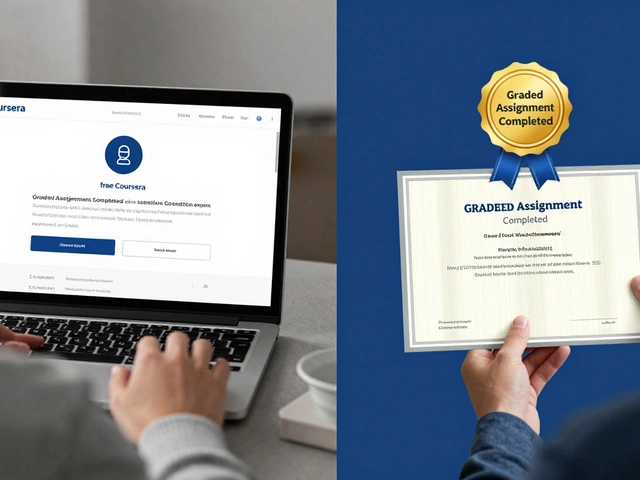Securing a job with the federal government can feel like embarking on a long and winding road. Many people are drawn to the stability and benefits associated with government employment. However, the path to landing a position is often fraught with complexities that require patience and careful navigation.
Understanding the prerequisites and the intricate nature of the application process is crucial. From preparing an impeccable resume to acing interviews, each step demands attention to detail. It's not just about meeting the basic qualifications, but standing out among a pool of qualified candidates.
While the appeal of a federal job is undeniable, it requires more than just the desire to serve. In this article, we aim to equip you with practical advice and insights into how to effectively prepare, apply, and ace your journey towards a rewarding career in the federal government. Whether you're a recent graduate or contemplating a career change, knowing the ins and outs can significantly boost your chances of success.
- Understanding Federal Job Requirements
- Decoding the Application Process
- Mastering the Interview
- Tips for Increasing Your Chances
Understanding Federal Job Requirements
Landing a federal government job requires a clear understanding of its unique set of requirements. The hiring process can be quite different from the private sector, emphasizing a merit-based assessment. Candidates need to demonstrate their ability to meet specific qualifications outlined in each job announcement. These qualifications often include a combination of education, experience, and sometimes specialized skills. Understanding these prerequisites is crucial to ensure that one's application stands out.
Federal agencies employ what's called the Occupational Qualification Standards, established by the Office of Personnel Management (OPM). These standards outline the minimum qualifications needed for different positions, typically categorized by grade levels. For instance, positions at the GS-5 level often require a bachelor's degree, while GS-9 might require advanced degrees or significant professional experience. Knowing these standards, and how they align with your own qualifications, can make a world of difference when applying.
Applicants must also navigate the Federal Resume Format, which differs significantly from a standard one-page resume. This format emphasizes detailed work experience, including specific duties, accomplishments, and official job titles. A federal resume often spans several pages and is more descriptive. It allows applicants to thoroughly present their abilities and how they match the job's requirements. It's vital to tailor your resume to each position, echoing the language of the job listing to ensure it aligns with what hiring managers are seeking.
"When applying for a federal job, it’s essential to take the time to fully understand what each role requires. Often, candidates overlook key qualifications for specific positions," advises Karen Wilson, a former HR specialist with the Department of Veterans Affairs.
The Pathways Program provides another entrance into federal employment, particularly for students and recent graduates. It offers internships and fellowships designed to attract talented individuals into government service. These programs have their own sets of eligibility criteria, typically based on academic achievements and relevant experiences.
Moreover, security clearance is often an overlooked requirement. Many federal jobs require some level of clearance, which involves a thorough background check to assess an applicant's trustworthiness. This process can be lengthy and imperfect, necessitating a clean history devoid of major legal or financial issues. Understanding whether a desired position demands such clearance can save applicants time and effort.
In assessing whether you're right for a federal role, remember that these positions are not just about meeting minimum requirements. The application process is about demonstrating your potential to contribute meaningfully to the organization's mission. Dedication to public service, integrity, and the ability to perform under pressure are valued traits in federal employment. By understanding and aligning with these requirements, applicants can significantly enhance their chances of securing a federal government job.

Decoding the Application Process
Diving into the federal government application process can initially appear as a formidable task, but with the right understanding and strategic approach, you can navigate it with confidence. The application journey starts well ahead of clicking the 'Apply' button. It’s essential to have a clear understanding of what the federal agencies are looking for, which often begins with understanding the job announcement itself. These announcements can be lengthy but are filled with crucial information. Buried within these paragraphs are key qualifications and experiences that the agency is seeking. It's about more than just meeting qualifications; it requires showcasing your experiences in a manner that aligns with the agency’s needs.
This is not just a job hunt, it's about offering your skills to serve the public. This means taking the time to tailor your resume carefully. Federal resumes are a different breed compared to typical resumes. They are usually much longer, often running three to five pages, and include specific details such as your work experience in rich, descriptive bullets. They require effort in customizing not just for the position but for the agency. Including every relevant detail, from job responsibilities to specific skills, can strengthen your application.
In parallel, you have the keyword challenge. Many federal agencies use automated systems to filter resumes, meaning the right keywords from the job posting could make the difference between your resume reaching a human reader or being discarded. Take time to dissect the job description and mirror those keywords in your application. Moreover, consider the additional steps required such as submitting a cover letter or supporting documents, each serving as an additional opportunity to reinforce your suitability for the job.
The detail required doesn't end at the resume. Navigating USAJOBS, the main portal for federal job listings, demands attention. Creating a profile on USAJOBS involves more than just uploading a resume; you need to diligently fill out your profile, ensuring it highlights your qualifications and experiences against the demands of federal roles. Your responses to application questionnaires should be honest yet strategic, aligning closely with your resume and the job requirements.
"The key to federal employment is understanding the requirements listed in the job announcement. Do not overlook the KSAs – Knowledge, Skills, and Abilities – as they are critical," says Sarah Forbes, a federal career advisor.
Delving deeper, networking can be an unexpected game changer in the federal application process. While it might seem that government jobs are filled in a straightforward manner, personal connections within the agencies can open up insights that job postings do not disclose. Attending federal job fairs or engaging in social media groups focused on government employment can offer access to those inside insights.
Finally, patience and persistence play an important role. Federal hiring can be slower compared to private sectors, with some positions taking months to fill as the agencies want to ensure the right fit for their teams. Understanding this reality and preparing mentally can help manage expectations along this voyage. Remember, each application you submit brings you closer to understanding and mastering the process of getting into federal service.

Mastering the Interview
Preparing for a federal government job interview involves more than just reviewing your resume and hoping for the best. It requires an understanding of the specific competencies and traits valued by the federal agency you are applying to join. This means conducting thorough research on the agency, its mission, and its culture. Having a clear understanding of these aspects will help tailor your responses and showcase how you can be an asset to them. It's not just about answering questions correctly; it’s about demonstrating that you embody the agency’s values and possess the skills needed to perform the job effectively.
An important aspect of mastering the interview is anticipating the types of questions that may be asked. Federal job interviews often include a mix of behavioral and situational questions, aimed at assessing how your past experiences and decision-making skills align with the responsibilities of the role. To prepare, identify examples from your career that highlight key competencies such as teamwork, leadership, and problem-solving. Crafting your stories using the STAR method—Situation, Task, Action, and Result—can help you deliver clear and concise responses. Practicing these stories will allow you to present them confidently and naturally during the interview.
Another vital step is understanding the security protocols and ethical considerations inherent to government jobs. Sometimes, interviews will delve into your comprehension of these aspects, evaluating your readiness to adhere to regulations and ethical standards. Since federal government jobs often involve handling sensitive information, showcasing your grasp of these principles can set you apart from other candidates.
While rehearsing your responses is crucial, equally important is preparing questions to ask your interviewers. Thoughtful questions demonstrate your genuine interest in the position and your proactive approach to becoming part of the team. Inquiring about the agency’s future direction, challenges, and how the role you're interviewing for fits into the big picture can transform the interview from a simple Q&A session into a meaningful conversation. Additionally, these questions provide insights that help you gauge if the agency aligns with your career aspirations.
Confidence plays a major role in how you present yourself during the interview. Dressing appropriately and exuding self-assuredness in your demeanor can influence the interviewer’s perception of you. Remember, federal agencies are looking for individuals who are not only technically qualified but also poised to represent the government with professionalism and integrity. This means being mindful of your body language and maintaining a balance between confidence and humility.
It’s also beneficial to note that, according to a 2023 survey performed by the Office of Personnel Management, those who had undertaken internships or fellowships with a federal agency significantly improved their chances of successful job acquisition. These opportunities provide firsthand exposure that is invaluable when interviewing.
“The more familiar you are with an agency's culture and processes, the better equipped you are to make a positive impression during the interview,” said Federal Career Coach and Author Kathryn Troutman.Crafting your narrative around such experiences can underscore your commitment and insider knowledge.
Ultimately, a successful interview is the result of meticulous preparation and genuine engagement. It’s about articulating how your government careers experience and personal values align with the role’s demands. By doing so, you not only boost your chances of landing the job but also initiate a rewarding career path within the federal workforce. By embracing these strategies, you are positioning yourself strategically within the landscape of potential federal employees.

Tips for Increasing Your Chances
When it comes to securing a job with the federal government, standing out from the crowd isn't just advantageous, it's necessary. The competition is fierce, and the selection process is rigorous. But there are tactical moves you can make to enhance your prospects. One of the most vital steps is crafting a resume that is not only polished but tailored specifically to the job you're applying for. Focus on integrating specific keywords from the job posting into your resume. This is essential because federal HR systems often use automated filtering tools. Hence, if your resume lacks those keywords, it might not reach a human's eyes.
Networking, while often overlooked, is another crucial step you can take. It's not just about what you know, but also who you know in the federal landscape. Attend events, seminars, and job fairs that are sponsored by various federal agencies. These gatherings are fertile ground for meeting officials and learning about upcoming opportunities. Building relationships with current or former federal employees can provide insights that are not available elsewhere. As one veteran federal employee once remarked,
"The pathway to government employment is often paved by those already in the system, guiding newcomers as mentors and advisors."Their insider knowledge can help you understand nuances that aren't apparent from the outside.
Proactivity is your ally. Don't sit back and wait for the right job to appear on your radar. Instead, regularly peruse government job boards like USAJOBS and apply consistently. Set job alerts for positions matching your qualifications and interests to ensure you don't miss out. Also, consider broadening your scope; sometimes slightly stepping outside your comfort zone leads to opportunities you never considered. And importantly, apply early as some federal positions have tight application windows. Confidence in interviews is paramount as well. Treat each interview as a learning experience, meticulously preparing by researching the agency and its missions, demonstrating a genuine understanding and interest. Exude confidence, but remain open to expressing genuine curiosity and eagerness to learn. A well-researched candidate often shines brightly during discussions.
Acquiring certifications or additional training related to the job you aim for can make you a more desirable candidate. There are numerous programs and courses designed to enhance your skillset. Show your commitment to professional growth. Some federal jobs even have specific certification requirements; meeting these can fast-track your application. Consider your language skills, too; proficiency in foreign languages can be an asset in many federal roles, particularly those related to international relations or national security.
Additionally, understanding the unique benefits and responsibilities that come with a government career is advantageous. Research the various perks that federal jobs offer, such as job security, pensions, and health benefits, and consider how they align with your long-term goals. Conversely, remember that government roles often demand a high level of accountability and may require navigating bureaucratic processes.
Remember, persistence is key. The path to securing a federal job can be lengthy; however, patience combined with diligence often pays off. Many applicants who initially faced rejections later found success in roles that were even better suited for them. Keep refining your approach, learn from each application experience, and adjust your strategy as needed. Each step you take brings you closer to crossing the threshold into a government career.




